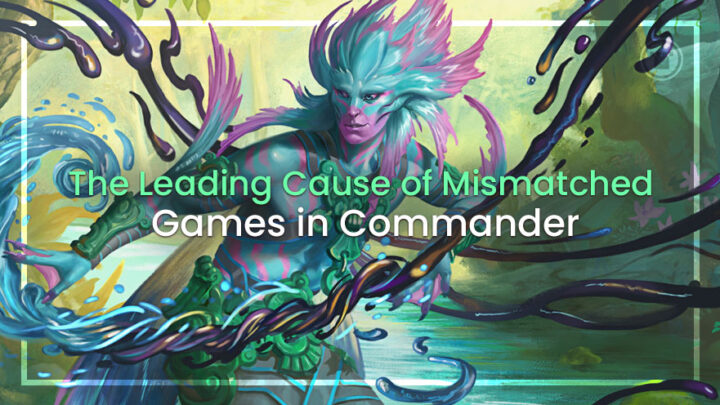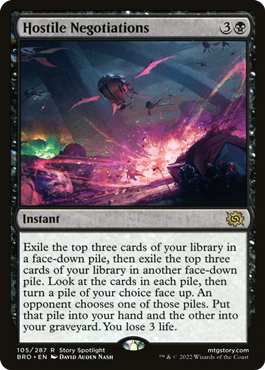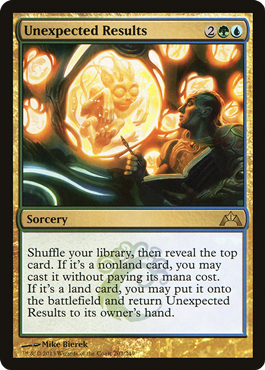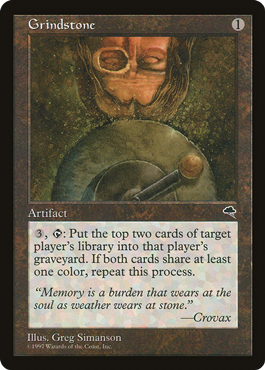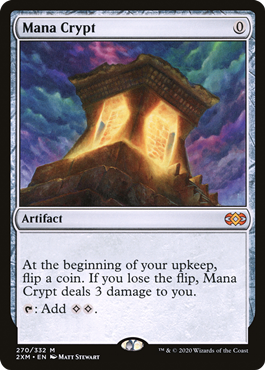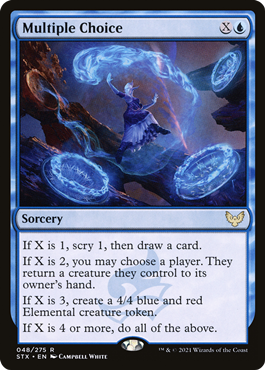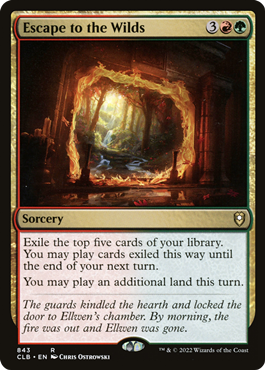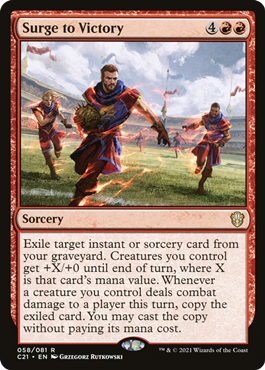Commander is a format that relies on a shared vision to succeed. Whether it’s having a narrative experience or striving for perfection with tight cEDH gameplay, Commander games rely on communicating expectations and hopefully finding people who want the same thing.
Pre-game chats, or Rule 0 discussions (a misnomer, if you didn’t realize, because Rule 0 solely involves deciding whether the Commander ruleset will be broken for this game), are the way in which players navigate, compromise and plan a game. They are extremely valuable, and most value is accumulated when they are able to evolve over time with regular players.
Common topics in a pregame chat can include:
- What turn does the deck win?
- What is the win condition?
- Are there any combos?
- Sharing any anti-social/oppressive cards in the deck
- What’s the relative “power level” of the deck and why is it 7?
I mentioned that compromise is part of pre-game chats above because you won’t always find your “goldilocks” game. Some players anticipate this by bringing a range of decks, and others ensure they have a relaxed attitude to what might go down. Compromise is key.
A common criticism of the Commander Advisory Group and Rules Committee is we don’t do enough to railroad untrusted play with the ban list. To be frank, we can’t solve untrusted play; only provide tools and advice on how to approach it in the best way.
One tool I advocate for that improves untrusted play is to have a post-game debrief to discuss where expectations failed to be met. This is great for established players, too, but far more important for untrusted play. If players go into the first game with the expectation that it might be a mismatch, and then they communicate, calibrate and shuffle-up to play again, they can arrive closer to their ideal game.
Still, mismatches happen, even with established playgroups. So, what is the leading cause of mismatched games in Commander, right now? I’d posit that it’s not the pod that is mismatched so often but players’ expectations.
Commander Has Changed
Before we get into the details, it’s good to take stock of the format itself. Modern Commander is a much more synergy focused format. Engines and value can quickly snowball, and eggs are placed in more baskets than they used to be, particularly when it comes to mana and draw engines. Many commonly played spells either cantrip or “treasure-trip,” allowing players to keep the plays coming and bank up mana to be used in ebbs and flows.
Haymakers are less valuable in a climate like this, and even with an increase in single-target removal, players can’t remove everything when everything is a “must-remove” game piece. Ironically, a parallel trend has been to run fewer board wipes. Fewer wraths mean synergy is rewarded further, and so despite the intent to move away from “Battlecruiser” toward more refined decks, what we’ve actually done is exchange naval vessels for Star Destroyers.
I could take a tangent here to talk about the influence of content on deckbuilding, but to sum up my thoughts quickly: content is designed for entertainment, so deck lists on some gameplay shows are edited to be less grindy.
Particularly with YouTube, many channels show only the “good” games and not the grindier or more oppressive ones. This perpetuates a certain approach to deckbuilding. But unless you’re making content, that doesn’t have to be your approach.
Exploring expectations
Many games these days involve one deck snowballing and seeing if the table has an answer. If not, they get to keep going and probably win.
The best strategy to win a game of Casual Commander remains to play at parity and pop-off second. By that point you can craft a hand of protection and removal for incoming threats and hope the rest of the table are interaction-lite from stone-ageing the first archenemy.
The reason many games are like this is not only because people run fewer wraths, but because people still build expecting to be met by wraths. And why wouldn’t you?
I’ve said before that haste is vital to turning the corner with combat decks because it helps you bounce back after a wrath. Lifelink buys you an extra turn, which is never more relevant than when you’re worried about dying on the crack-back from a persistent threat.
Essentially, if you build in such a way that accounts for wraths – with plenty of protection, efficient recursion and an emphasis on turning the corner – then when players don’t wrath, you end up snowballing. It’s not a bad thing to build a deck to win, and more players should think about win conditions when they build.
If people expect a wrath and one isn’t played, their deck will overperform. It’s simple, and it’s why sometimes games feel mismatched. It’s not fun if you’re being snowballed, and it’s often not fun to be the one doing the snowballing. Striving and expending effort to win is rewarding, but being unimpeded is not.
But What About the Grindfests?
“So why are some of my games a grindfest?” you might be asking. “Why does it feel like people have too much removal or not enough?”
Well, that’s a good question. It’s something I’ve been thinking about a lot, and I think it boils down to the makeup of a pod. In my experience, the most “balanced” pods (and I say that knowing this is only my taste and not everyone’s) are the ones where there is a balance between the classic deck archetypes.
On a meta level, no matter the Commander deck, it can be classed as Aggro, Midrange or Control/Combo. If you have too many Control decks, they can stifle an Aggro deck’s ability to do anything.
Likewise, three Aggro decks will murder the Control or Midrange player. The exact makeup of a pod is more of an art than a science, but roughly speaking, it feels best when there is at least one of each archetype but no more than two of any.
Why does this matter? Well, the games that are a grindfest are usually that way because you have three decks with plentiful access to control or reusable removal. The portion of games that end quicker with a snowball aren’t only due to lack of wraths, but sometimes just because there are too many Aggro decks in a pod for the game to last longer.
What Should We Emphasize More, Pregame?
While the pre-game topics I shared at the beginning of this article are great starting points, I think more conversation should be focused around figuring out how not to sail past each other. Magic is a game built upon interaction. It’s one of the only games where you can play cards in an opponent’s turn in response to what they’re doing. Consider talking about:
- “Explosiveness:” Essentially, how capable is the deck of having a “big turn”, and how frequently.
- Mana Generation Beyond Turn Count: is your deck curving out with fast mana? Well you probably already ascertained that, but treasure and other passive mana generation is also a contributing factor
- Are we playing optimally or more relaxed: this one is huge, because if players have different expectations for the gameplay experience, this is what sparks debate about threat assessment
- Optimization: how lean is your curve, how many “pet” or none-staples are you running, and are you running many free effects
- How much of the chess clock does your turn take, relative to the other decks at the table
- The relative potency of your Commander
That last one is super important, because decks that can rely on a four or less mana value Commander that generates card and/or mana advantage generally outperform decks that have a more “vanilla” Commander.
“Vanilla” in Commander is an interesting distinction. Here, it refers to cards that have little impact on the board and don’t accrue perpetual value from staying in play. We all know Korvold is leagues above Lyra Dawnbringer, but think more on the less obvious comparisons, too.
Avoiding Mismatched Games
While games can still be mismatches due to poor communication or bad intent, I still contend most of the mismatches we feel we experience are more about misaligned expectations. Players should learn to roll with the punches, and part of that is admitting that in the time of synergy, decks will snowball and there’s not a lot you can do about it. Or is there?
Well, it feels like there’s a fork in the road: either accept that your meta is like this or play more board wipes. Your deck can’t be made up entirely of single-target removal because it doesn’t actually solve some board states you’ll come across. Play Cyclonic Rift or Farewell for all I care — just make sure you sequence around them properly and include enough win conditions to not drag the game out.
The complaint I see time and again with board wipes is they feel like a big tempo loss. Why take a turn off? Who are you helping?
While it’s a valid line of thinking, it’s ultimately something that can be solved with player agency. Tempo loss can be offset by sequencing. It can be offset by playing one-sided wraths or cheap ones. Sure, keep it in your hand after the 2 hour mark if you’ve got nothing better to do. That’s beside the point.
Wizards of the Coast may be the ones spiking our gas tanks with nitrous oxide, but players still have agency. We’re on the road to optimization without restriction, games that barely reach turn eight. The final destination is fringe cEDH, and we need to take the wheel and pick a point to stop along the way.
Here are some of my Commanders and one-sided wraths they enjoy:
- Hofri Ghostforge: Diving Reckoning and The Eternal Wanderer to keep Hofri and get tokens; Mob Rule to steal other creatures with the intent to sac them; Terror of the Peaks for burn; Dire Fleet Daredevil to cast someone else’s.
- Sigarda Enchantress: Winds of Rath and Austere Command for selectivity; Eternal Wanderer to keep Sigarda
- Neyali: Martial Coup and White Sun’s Twilight to make tokens; Settle the Wreckage for the opportunity to ramp ourselves when going wide
- Edgar Markov: Ruinous Ultimatum, Olivia’s Wrath and Midnight Arsonist are one sided; Living Death and Austere Command provide flexibility; Markov Enforcer, Retribution of the Ancients and Vish Kal, Blood Arbiter provide repeatable pruning that synergise with our strategy.
Wraths in 2023 never have to be symmetrical. In fact, they can mostly be one-sided or synergize with your strategy. And above all, they synergize with your main strategy: not losing. If you go wide or you’re aggressive, you can bank on player removal, too.
But if you don’t? Well, play more wraths.
Filter Out
One thing that prompted this article was seeing and discussing Filter Out. The card feels like a turning point in design, not just for blue — a color that has been gagging for more efficient interaction that’s also not as boring — but for the approach to removal in Commander in general. This spell is aggressively costed and solves a lot of “Modern Battlecruiser” board states. It’s also particularly good at hosing treasure and Dockside Extortionist.
I’m hoping this isn’t a sign of how pushed removal will be in future, because that would feel like a heavy handed, manual correction. Incentivising people to play more wraths by making them absurdly good is just another flavor of power creep.
Hopefully, this is just blue’s Toxic Deluge/Blasphemous Act, but I am keenly watching how widespread this card is played and whether anything similarly efficient follows.
A Final Note On Player Expectations
I’ve written a lot today already, but to close things out, I want to take a moment to touch on one final aspect of player expectations: player motivations.
If you’re terminally online, play in an entrenched playgroup or are just invested in and good at Magic, then some player behaviors and motivations might come as a surprise. Likewise, if you’re newer, some veteran Commander players might seem tryhard or even laissez-faire in their attitude.
Not everyone plays Commander the same way, for the same reasons or with the same outlook. When I learned to play, playing against puzzles with “unfun” cards like Dictate of Erebos was part of learning the ropes.
Newer players aren’t so much “soft” due to the propagation of the social contract so much as they’re playing guided by different heuristics and shaped by different experiences. Players build, play and enjoy a game based on these vastly different experiences. That’s why finding a “goldilocks” experience can be so difficult, and why compromise is so important.
There’s also a toxic positivity almost, a level of entitlement that runs deep in a lot of Commander discourse — particularly online. It’s leaving people feeling bad for winning and being told “not like this.”
It’s a big thing to unpack, but one important takeaway is that life sucks for a lot of people right now, people seek escapism and many choose games for that outlet.
I would say that in picking Commander that way, people are making a poor choice. You aren’t always guaranteed dopamine when playing Commander, especially in untrusted play, and you will quite often lose (sometimes dramatically, if a player snowballs). If your escapism chips are all on the Commander square, it’s easy to fall victim to frustration, and even take it personally, reacting badly.
To truly enjoy Commander, it needs to be viewed as a spectator sport in part, because for 3/4 of a turn cycle, it kinda is! You have to be happy and excited to see other people pop off — and similarly people should be hyping your plays and hamming it up. It’s not drama school, but at least acknowledge what’s happening with a positive attitude.
Experienced, emotionally mature players know all of this of course, but I think the chasm between these players and the aforementioned escapists is they aren’t ever left feeling short changed because they had the right goals, but also the right expectations. If you want to escape and feel in control, a videogame or co-op board game is a much better pursuit.
And while we’re mentioning board games, Commander isn’t a Eurogame; player conflict is direct, combat is plentiful, you will be eliminated before the game ends and both luck and chaos play a big part in who wins.
You can certainly communicate pre-game that your intent is to let players set up and choose to not play in a cutthroat way right from the beginning, but at a certain point, all bets are off. The game has to end, and the only way to gain points (beyond arbitrary acknowledgements of “cool synergy” or “ha, that’s so on theme”) is to win.
END STEP
Fewer games of Commander are mismatches than you might think. The format is in a period of change, with a constant influx of new cards. With it moving so fast, adoption of new cards and approaches is centered on the obviously pushed designs.
Given breathing room, playgroups can figure out what they want out of a game, and players can evaluate whether they truly want to keep optimizing or choose a point at which they stop.
Me? I chose not to put Teferi’s Protection in my Syr Gwyn list because I want people to have a chance at unpicking my board.
Think about what your motivations are when you sit down at a table, consider some of the pre-game talking points I’ve shared today and above all? Ensure you’re not pinning all your escapism on Commander, or you’ll be let down time and again.

Kristen is Card Kingdom’s Head Writer and a member of the Commander Format Panel. Formerly a competitive Pokémon TCG grinder, she has been playing Magic since Shadows Over Innistrad, which in her opinion, was a great set to start with. When she’s not taking names with Equipment and Aggro strategies in Commander, she loves to play any form of Limited.

